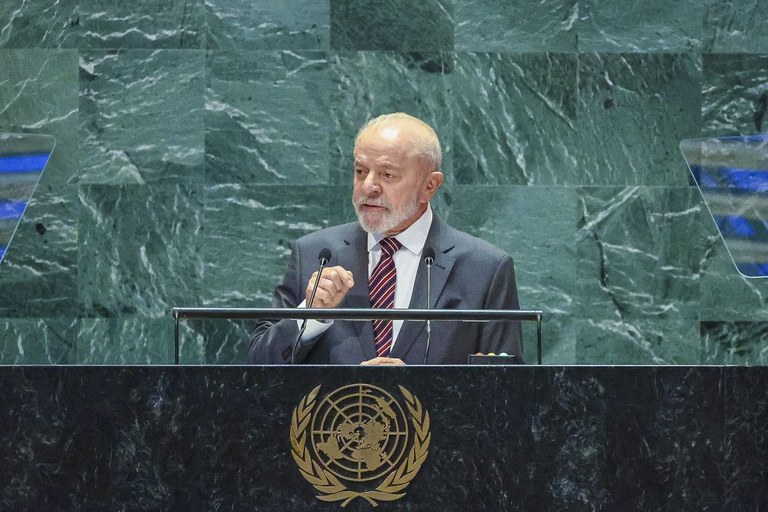Notícias
FOREIGN AFFAIRS
“We need courage and political will to change”, says Lula at the opening of the Summit of the Future, in New York

President Lula during the opening of the Future Summit at the United Nations (UN) headquarters in New York. - Credit: Ricardo Stuckert/PR
President Luiz Inácio Lula da Silva participated this Sunday, September 22, at the opening session of the Summit of the Future at the United Nations (UN) headquarters in New York, United States. The event marked the approval of the Pact for the Future, a document containing commitments regarding reforms of the multilateral system.
“The Pact for the Future shows us the direction to follow. The document addresses important issues – such as the debt of developing countries and international taxation – in an unprecedented way. The creation of a forum for dialogue between heads of State and Government and leaders of international financial institutions promises to put the UN back at the center of the global economic debate,” highlighted the president at the event opening.
+ LEARN MORE
>> Speech by President Lula at the Summit of the Future opening, in New York
The Pact for the Future shows us the direction to follow. The document addresses important issues – such as the debt of developing countries and international taxation – in an unprecedented way. The creation of a forum for dialogue between heads of State and Government and leaders of international financial institutions promises to put the UN back at the center of the global economic debate”
LUIZ INÁCIO LULA DA SILVA,
President of the Republic
The Summit of the Future precedes the UN General Assembly, gathering chiefs of State and Government of the organization’s 193 member states, as well as representatives from civil society, researchers, the private sector, and youth. The event also seeks consensus for the Global Digital Compact and the Declaration on Future Generations.
“The Global Digital Compact is a starting point for inclusive digital governance that reduces the asymmetries of a data-driven economy, and mitigates the impact of new technologies such as Artificial Intelligence,” stated Lula.
REFORMS Despite acknowledging the significant progress outlined in the Pact for the Future, the president argued that global leaders still lack the ambition and boldness needed to drive more transformative change. He underscored that the global governance crisis demands structural transformation. “The pandemic, conflicts in Europe and the Middle East, the arms race, and climate change have exposed the limitations of multilateral bodies. Most bodies lack the authority and means of implementation to enforce their decisions,” he argued.
In the president’s assessment, the General Assembly has lost its vitality and the Economic and Social Council has been rendered ineffective. Furthermore, he advocated that the Global South must be represented consistently with its current political, economic, and demographic significance. “We need courage and political will to change, creating today the tomorrow that we want. The best legacy we can leave to future generations is a governance that is capable of responding effectively to the challenges that persist and to those that will arise,” Lula highlighted.
NO BACKING DOWN — The Brazilian leader also stressed the importance of safeguarding the progress achieved over the past decades, ensuring no backsliding. “We cannot back down in promoting gender equality, nor in the fight against racism and all forms of discrimination. Nor can we go back to living with nuclear threats. Regressing to a world that is divided by ideological borders or zones of influence is unacceptable,” he said, adding that naturalizing the hunger of 733 million people would be shameful.
SUSTAINABLE DEVELOPMENT — Lula also spoke about the 2030 Agenda, the global plan composed of 17 Sustainable Development Goals (SDG), established during the UN General Assembly in 2015. According to the president, the SDGs “were the greatest diplomatic undertaking in recent years, and are becoming our greatest collective failure.” He signaled that if the plan’s implementation continues at the current rate, only 17% of the 2030 Agenda targets will be achieved on time.
COMBATING HUNGER — The SDGs include hunger and poverty eradication. In this context, Lula pointed out that, as the presiding nation of the G20 — a group comprising the world's largest economies — Brazil will launch a Global Alliance Against Hunger and Poverty, aimed at accelerating efforts to overcome these scourges. The G20 Leaders Summit is scheduled for November 18 and 19 this year in Rio de Janeiro.
CLIMATE — The president also addressed the issue of climate change. “The current levels of greenhouse gas emission reductions and climate finance are insufficient to keep the planet safe,” he stated. Against this backdrop, he highlighted that Brazil will work towards a global ethical assessment, in partnership with the UN Secretary-General, António Guterres, bringing together different sectors of civil society to reflect on climate action from the perspective of justice, equity, and solidarity. The initiative will be part of the preparation for the UN’s 30th Climate Change Conference (COP30) to be held in Belém, the capital city of the Brazilian state of Pará, in November 2025.
OTHER COMMITMENTS — During his official visit to New York, which runs until Wednesday, September 25, President Lula will participate in the opening session of the General Debate of the 79th United Nations General Assembly (UNGA), the event titled "In Defence of Democracy: Fighting Against Extremism," and the opening session of the second G20 Chancellors’ meeting. He will also hold several bilateral meetings.
As the current president of the G20, Brazil is also using this platform to drive global governance reform. This effort includes the launch of a Call to Action, which is expected to be adopted at the meeting on Wednesday, September 25.
The president is accompanied by Brazil’s Minister of Foreign Affairs, Mauro Vieira. Other Ministers of State are also participating in United Nations meetings. The Brazilian delegation is engaging in high-level discussions on a range of issues, including the strengthening of multilateralism, global governance reform, the defense of democracy, and peace consolidation, among others.
